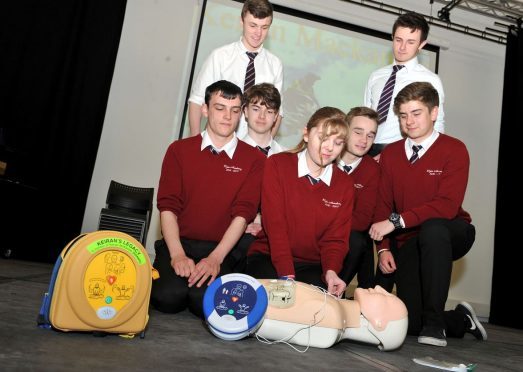Teenagers at a Moray school have been given life-saving skills in memory of one of their former classmates.
Keiran McKandie died after being involved in a collision with a car on the outskirts of Elgin last year.
Since his death his parents Gordon and Sandra have been tirelessly raising funds for defibrillators that could save lives.
Yesterday they donated one to Elgin Academy, where their son would now have been in sixth year.
And friends of the teenager demonstrated CPR on dummies to show how their fellow pupils could save a life themselves.
Caitlyn Gallagher, 17, said: “If you can save one life then it’s worth it. Even just doing the training in the school helps.
“It helps because with Keiran’s memory I feel I am contributing and I am making a difference in his name.”
Kenneth Maciver, 17, added: “With more and more defibrillators appearing in public places it’s important people aren’t afraid to use them.”
Caitlyn and Kenneth, who went mountain biking with Keiran, both learned CPR through volunteering with the Red Cross.
The teenagers talked their classmates through the steps needed in order to help someone who might be in cardiac arrest.
About 50 senior students at Elgin Academy then practiced their skills on dummies in the school hall after watching a moving video featuring clips of Keiran cycling.
His parents have now raised about £30,000 to buy defibrillators and hope to install one in every school in Moray.
Depute head teacher Kyle Scott told the students that skills would become “vital” as they grew up.
Expert resuscitation officers from NHS Grampian were also at the school to guide the students through the heart-start process.
Mrs McKandie said: “Obviously going to the academy is important for us because it’s where Keiran went to school – he should be getting ready to leave about now.
“It’s important to start with the sixth years because they are about to leave school and if they’re familiar with defibrillators and now CPR then they won’t be scared to use it in an emergency.
“They do this in Scandinavia and it has increased their survival rate from cardiac arrest to about 50 or 60% from less than 10%.”
